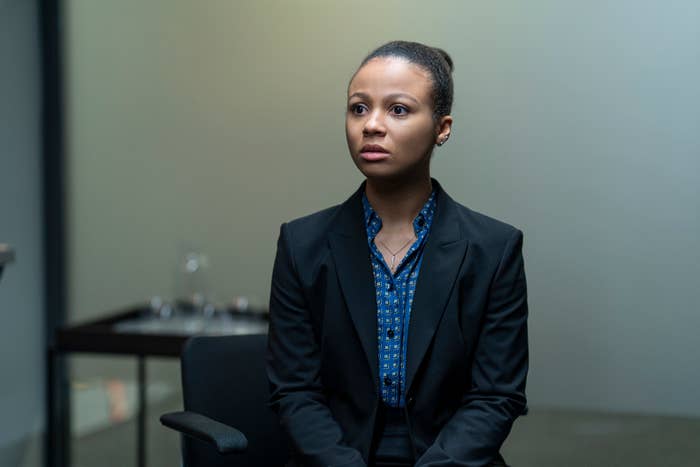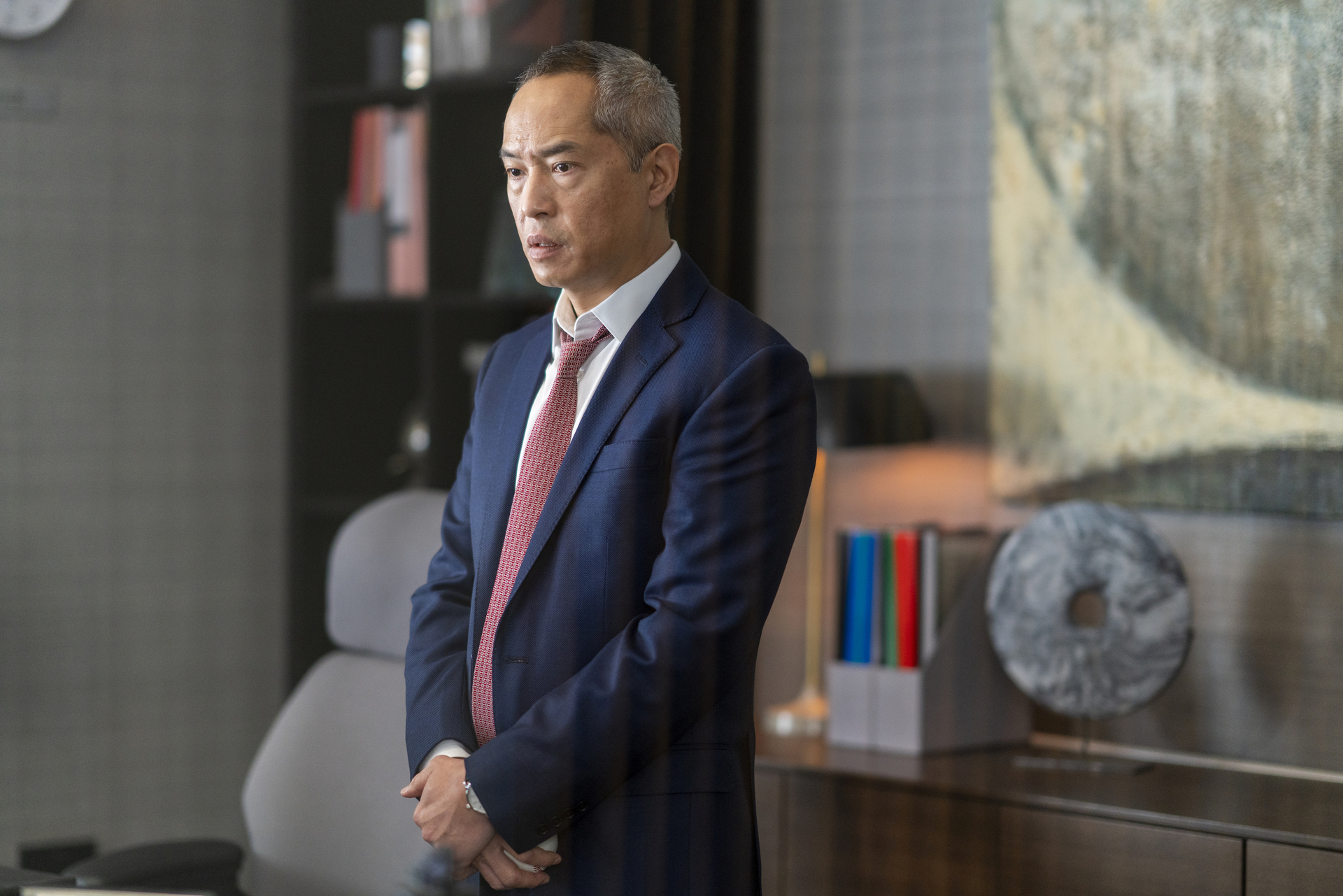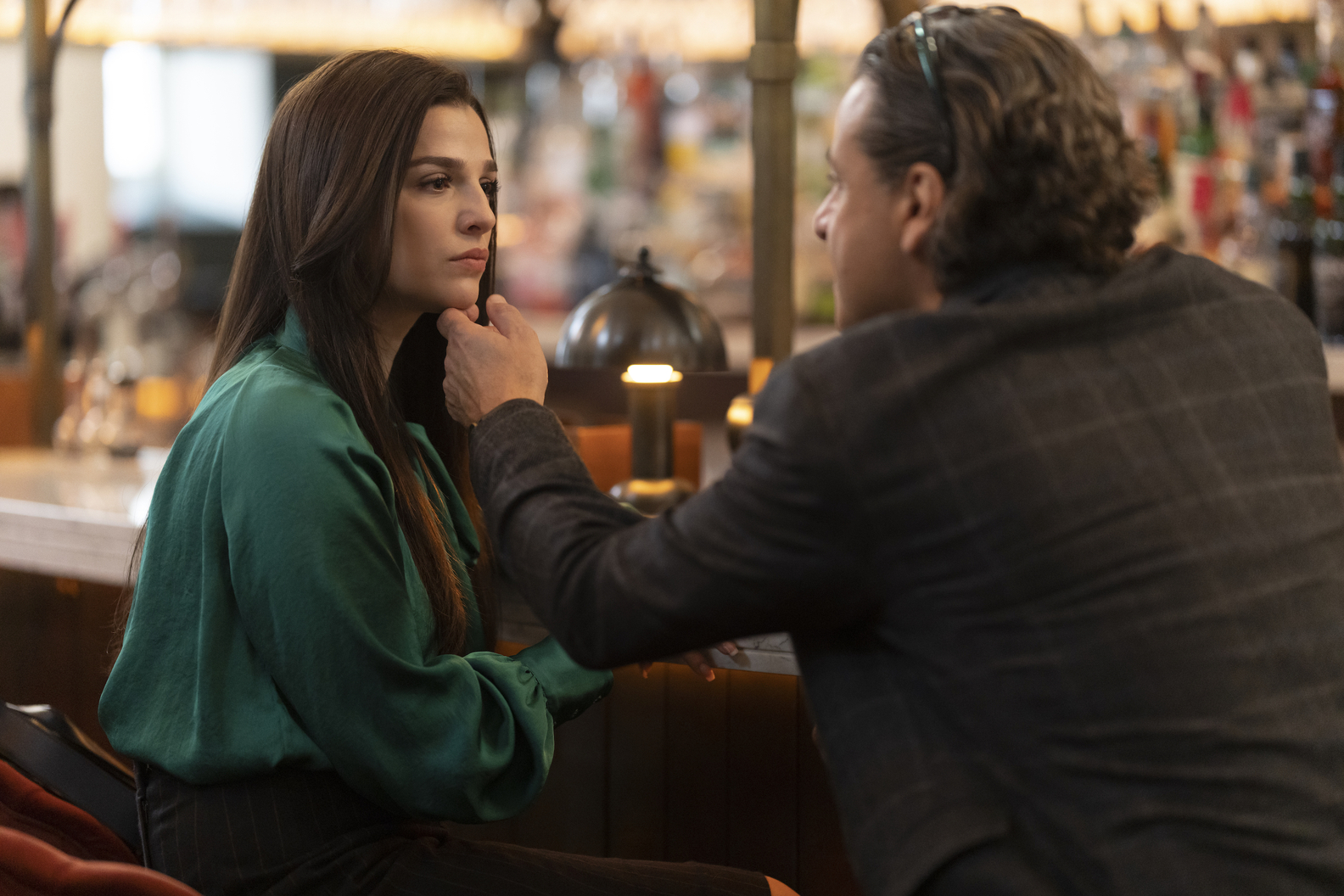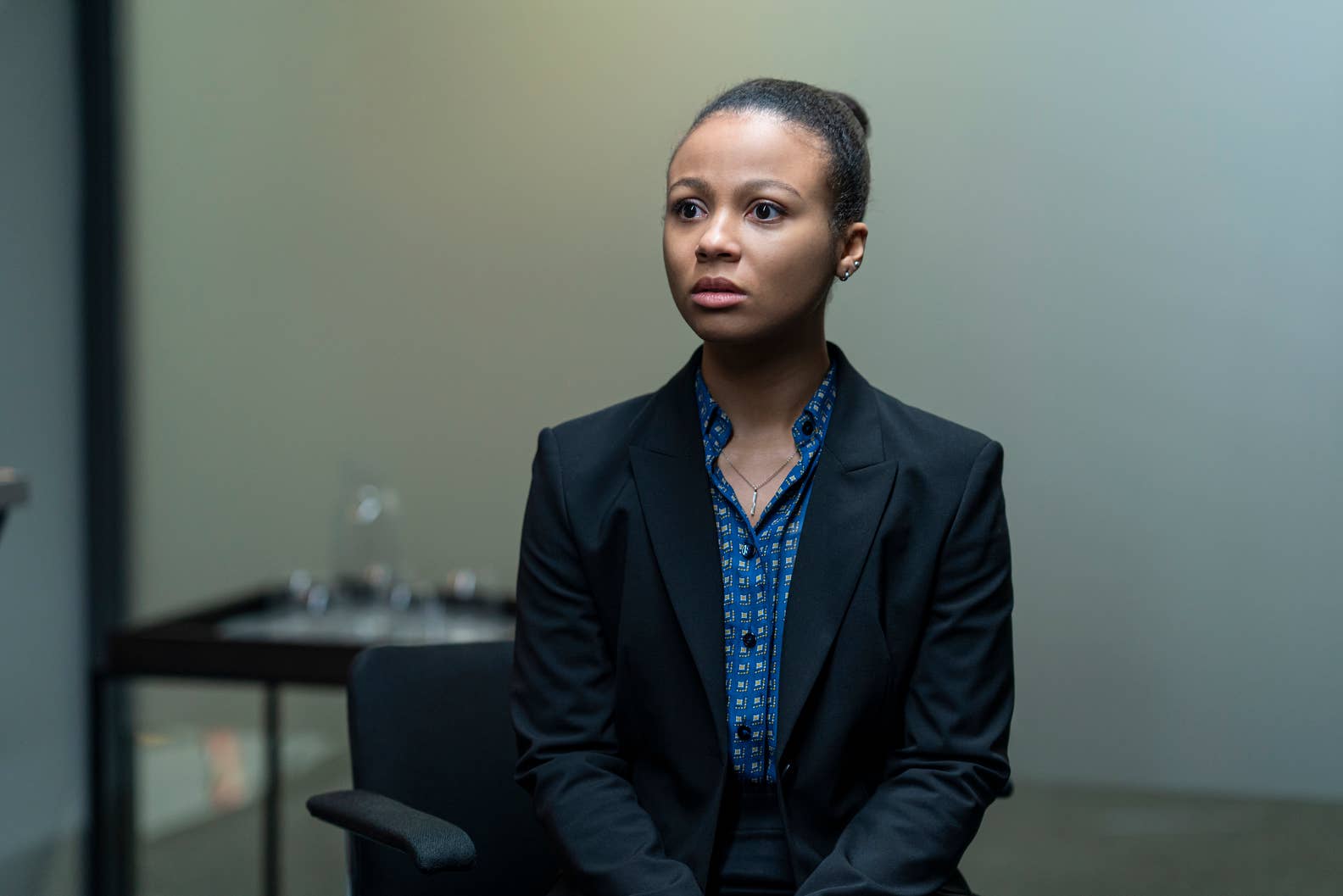
Spoilers for Industry Season 2 below.
Industry is on one. The HBO series just finished its superlative sophomore season—for my money, it’s the best thing airing right now—with a true mic-drop moment: After successfully politicking to keep both her job and the London office of investment bank Pierpoint & Company around, Harper Stern (Myha’la Herrold) and her boss Eric Tao (Ken Leung) take an elevator ride that will change Harper’s life forever. As she marches down the hall with Eric, she’s led into a conference room, where she’s presented with her falsified university transcript from the early days of the series’ first season. Essentially Industry’s version of Chekhov’s gun, it’s a long-simmering plot point that creators Mickey Down and Konrad Kay had waiting in the wings for a dramatic reveal. Eric knew about the transcript but was willing to play along with the lie because he saw something of himself in her, but Eric felt the need to stop her Icarus moment before she flew too close to the sun. As such, Harper is fired, effectively immediately, from Pierpoint.
Considering Harper’s entire life depends upon staying in London (she says going back to New York is a “non-starter”), her firing is one hell of a way to end the season. It evokes the same feelings of how the Breaking Bad creative team would often write themselves into a corner for the challenge of then fighting back out, which is exactly how the two Industry writers feel about this conclusion, with Down telling Complex that “the creative challenge of writing yourself out is kind of thrilling.”
With such a crazy finale, Complex spoke with Down and Kay about how the big reveal came together, how Eric made the decision to take Harper down, the most challenging scene to write, and much more. This interview has been edited for clarity and length.
How did this ending come to you? Did you figure it out in the writers’ room? Or is it something that you already had in mind and worked back from?
Konrad Kay: That’s a really good question. Do you remember, Mick?
Mickey Down: It was a dirty little idea that we had as we were writing it. We were almost too afraid to bring it up with other writers because we love it, because it makes good on something we set up in the first [pilot] episode, which I think most of the audience assume we’ve just totally forgotten as a mechanical plot point. [That] was good for the pilot but didn’t have any resonance for the rest of the series. We were bringing it up constantly, thinking, “Is this something we could actually do?”
There was a bit of—I’d say—heated discussion about whether we should or not, because it’s quite a big moment to [Laughs.] do to your lead character. But we thought, first, it’s super juicy. Secondly, it makes good on the thing we’ve set up. And thirdly, it’s just super surprising, I think. Most people who work in the show had read the scripts and knew that that moment was coming. But a few people in our production, namely the sound guys, were watching it as it came in. They weren’t reading the scripts; they were just watching the cuts as they came in before they were doing the mixing. I remember them saying to us [that] they did not see that coming at all, which I found really good. Me and Konrad, whenever we write, we’re trying to surprise the audience in a way that feels organic. This is probably just my writer’s brain thinking everything you can see from a million miles away. So I just think that twists like that are never going to be satisfying for the audience. Whereas like, actually hearing from people who hadn’t seen the cut before that it was actually a genuine surprise was really, really satisfying for me.
KK: It’s such a weird word to use in the context of the scene, but I find that the ending is kind of romantic. A lot of the way we conceived the season in the writers’ room was this idea of a Western. A lot of the beats are, “There’s an old cowboy, there’s a young cowboy. Harper’s the young cowboy, she’s gonna supersede the old cowboy [and] midway through the season, that old cowboy is gonna get sent to jail. He gets sent to jail, he’s depressed, he’s listless. The young cowboy realizes, for one big score, she’s going to need the old cowboy again. She pulls the old cowboy out of jail. The old cowboy is like, “I know my place now, underneath the young cowboy. She’s going to take the reins. But then ultimately, I’m gonna kill her.”
I think there’s a great tragic, romantic, weird element to it, which I think you feel in the lift on the way up. There’s a sense that it’s really ambivalent because there’s a tenderness to the fact [Eric says,] “I’m doing this for you.” But also, she has been a thorn in his side for two seasons. A lot of viewers will be like, “The rational thing is to get rid of this really difficult young woman from his life.” What’s really cool, I guess, about the way Ken and Myha’la play it is [that] it’s the one moment where, through money, he’s able to show her love. He’s like, “I paid for your hotel bill and by the way, I’m about to do this thing to you, which is an act of love. But it also means that you’re dying.” What I love about it is [that it’s] all the emotions that are in their relationship, the difficult-to-pin-down stuff. What is this? Is it love? Is it hate? It’s all of those things. That’s what I liked about the scene.
MD: In some ways, it’s very traditional storytelling around a sort-of death moment, because it’s the characters getting their affairs in order just before someone dies. If you were to pause it there and actually think about what’s going to happen next, you’d probably think something bad like this was going to happen, just because it’s the first time—as Konrad said—[that] they’re genuinely showing affection to one another. She puts her hand on his arm. He almost looks like he’s going to tear up. He looks absolutely like he’s been through the wringer in that scene—they both do. We’re back to basically where we started. We’re kind of friends again. I got this sense that there’s some kind of affection for me. Wow, this is gonna be a partnership that can last maybe two or three or four more seasons! Then, they walk down a corridor and she’s walking toward her execution.

It’s a death march, right?
KK: Definitely. As Mickey said, there was a thrill for us. There is painting yourselves into the corner because there’s no guarantee of a third season ever. We were like, “What is the most emphatic full stop we could tell here? And do so that way because it feels like a good, cohesive season of TV.” If [we] were to get the sort of honor of doing a third season, then you’re suddenly in this kind of quandary of like, “Okay, creatively, what the fuck do we do now?” The idea of having Harper outside Pierpoint is quite creatively thrilling to us.
MD: This might not be interesting for anyone, but it’s actually sort of one of the most realistic parts of the season, in that if you were discovered to have no transcript—regardless of not going to university, regardless of how well you’re doing your job at a bank like that—you’d be fired. You’d probably be blackballed afterward, or it’d be very difficult to get another job.
KK: In the context of the episode, she basically admits securities fraud to her boss. What you could do in that situation is pull the tapes of all of her and Jesse’s recordings [and] report her to HR. But instead, he brings up this thing that he’s always had in his back pocket just to shimmy her out the door. What’s good about it is people will think, “Is it revenge? Is it retribution? Is it compassion?” I think it’ll be quite difficult to pin down, because you can make a solid case for all of that.
Is it safe to say you’re really excited about the creative challenge of trying to write yourselves out of this?
MD: Yeah, absolutely. We know what we’re gonna do if we’re given the opportunity. We have what we think is a very good solution to it. We can’t really go into details about it, but we love it. Vince Gilligan and the Breaking Bad team always used to say that they’d write themselves into corners and that the creative challenge of writing yourself out is kind of thrilling. Me and Konrad are the same. We constantly write Harper into corners. We constantly do things of which we think, “How the fuck is she getting out of this?” Usually, she gets out of it by self-sabotage. Or by screwing someone over.
KK: There’s a reason people write themselves into those cul-de-sacs: Because the finality is dramatically satisfying. If you were to watch this episode, and it ended on a bit of a dash, you’d be like, “Fuck, I have to wait another 18 months, or I might even not get the answer.” Mick, correct me if I’m wrong, but at no point did we really come off this being the ending in the brainstorming process. We were always building toward it.
MD: We always wanted to do it. But we have collaborators. Obviously, me and Konrad run the show and we are the creators, but we love bringing all the writers and producers on board with us. It was us having to convince people that this was the right thing to do. It’s funny to think that now, ‘cause the execution of it by the director, Isabella Eklöf, was excellent. Everything that went into that last scene really elevates what we wrote.
Was it on the page that we didn’t see her reaction?
MD: No, it wasn’t. It wasn’t even a directing thing. It was in the edit. There was this nice shot that pans from Ken after he says, “You’re fired, Harper,” to the back of Myha’la’s head. We had coverage to show her face, but we thought that’s a nice bit of ambiguity. What is Harper’s reaction to that? Is it relief? Is it shock? Is it pain? Is it like, I can stop running now because I’ve been found out—like a criminal mastermind who’s been on the run forever, who finally gets the opportunity to bow out because someone has stopped them in their tracks. Is it that? Or is it just literally like, “I’ve been fired”?

So I want to talk a little bit about the elevator scene, because that really does feel kind of like the Rosetta Stone to a lot of that. How many different drafts did it take for you guys to nail that? Was that something you figured out pretty quickly?
KK: The various beats in it we came up with pretty quickly. We always thought it would be a nice callback to suggest that Eric paid for Harper’s hotel, because it showed love through money, which feels like the very cynical heart of the show on some level. Like, he can only display his affection for her by paying for something, which feels in keeping with the universe of the show. The “blow on your hand” thing was a reference to something that happened in 2x01, when he tells Robert to do it.
MD: The callback is actually something we cut. We were worried that in cutting the setup, the callback wouldn’t make any sense. I think it’s much stronger as it’s something that Harper instigates.
KK: Isn’t that still in? Or have I gone mad? He tells Robert to do it, doesn’t he? I’m pretty sure he does. “See, you’re alive after all.” I can still hear his dialogue.
MD: I’m pretty sure we got rid of it from the first episode. You’re seeing a bit of our process, Will.
KK: I’ve got a feeling it’s still in that first thing because we’re on Harper’s face for it, I’m pretty sure.
MD: Yeah, I think you’re right, it is there. [Ed. Note: It is, indeed, in the final edit.] So it’s a callback.
KK: We knew that because what was coming was, effectively, an execution. We wanted it to be tender. Let’s make this moment as tender as possible, because it feels satisfying that after 16 hours of them together, they can finally touch each other or something can happen between them. It can only happen in the moment when he realizes that he’s going to get rid of her. There was some dramatic irony there that we liked. We just led into it as hard as we could.
MD: We added that line, “I’m doing this for you,” quite late as well, because I thought even if that’s not true, that’s the justification he gives himself in that moment for doing it even though—I think Konrad mentioned this before—the idea that he might have just been acting out of pure self-interest is a really interesting one. That is a perfectly fine reading on it. In the moment, Eric thinks that what he’s doing is the best thing for her, or at least he’s convinced himself of that.
I think you both laid out the why of that pretty well, but I’m curious about the when. So when do you think Eric made the decision to do what he does?
KK: Great question. Mick, you have a good handle on this.
MD: There are a few moments of good, subtle acting that Ken does in the episode when you see through his eyes: the—this is too big a word—monster he thinks Harper has become, like the way she is being so self-destructive and destructive toward the people around her. There’s a few bits that come to mind for me, which are when they were in the meeting with Bill Adler. Eric brings up the idea that Venetia has been harassed by Nicole. Then Harper jumps onto it and says, “The client in question also abused me.” She uses that information. You can see a little bit—just before Eric then does his next line—you can see him getting a little bit uncomfortable [about] the way that’s come out of Harper’s mouth.
Harper says it with such clarity and conviction and sociopathy almost. He’s slightly scared by that version of her. Harper is trying to keep herself together, be as professional as possible, and deliver that information as if it’s business-like, but I think he sees something quite cold and calculated. Obviously, what they’re doing is cold and calculated, but her intonation there really scares him. Then, there’s the bit in the same scene when Harper says “cut them” in reference to DVD and Rishi; there’s another bit of acting Ken does where he really looks at Harper. He’s like, “Oh my God, what have I created?” That is so callous, the way she’s just done that.
It’s not like Eric, who has been in the business for 20 years and realizes that’s part and parcel of being in the business and being successful. This is someone who’s just come into it and is acting like that already. What’s going through his head there is, “Yes, this is a person who’s going to thrive in this industry in so many ways, but it’s also going to completely destroy her.” What you’re seeing there is someone who’s prematurely been hollowed out by it. He’s terrified.
KK: I love those bits of acting that he does that Mick just called out. They’re the best bits in those scenes, because, as Mickey says, she’s gone beyond him to the point where he’s like, “Wow.” There’s a bit when he calls her, saying the plan’s going ahead, and to cover in front of Rishi, she says, “Hey, dad.” When we initially cut that scene, we didn’t return to him after the call ended, and there’s a bit when he’s in the corner of his office and you go back to him, he puts his hands together.
At that point, it’s the fact that she’s used this weird intimacy between them. It’s all very subconscious stuff. That’s just the way I read it—not post-fact, not intentionally. That he’s thinking about his own relationships with kids and what would be the best thing for this person. It’s mainly what Mickey said. Then that little thing is the bow on all of it that makes his decision for him. Mick, correct me if I’m wrong, but in the corner of the office, when he puts his hands together, it’s when he’s thinking about doing what he’s doing.
MD: When he hears those two answers before, he’s like, “Wow, this is quite dangerous.” Now, when he hears this, it’s like this father-daughter relationship they have, which links back to his own relationship with his children. It’s been perverted by the fact that she’s saying, “Hi, dad.” It’s a really callous thing. He feels dirty. He sits down. He’s looking around his office. He’s like, “Wow, it’s for this, is it? What do I do now?”

So I spoke with Konrad and Ken a little bit about this, but I need the official, on-the-record [explanation] about the “Kendal Roy” line. It sounds like it was a collaborative thing on the day of, but I need the full story.
KK: I was on set. I cannot remember who came up with it. All I can remember is someone said it. I remember texting Mickey and saying, “Do you think HBO would allow this? Do you think it’s funny?” Mickey was like, “It’s fucking funny.” So then we would do it in every subsequent take. We were really worried about what it suggests in the Succession/Industry universes. But HBO loved it, didn’t they, Mick, or am I wrong?
MD: Yeah, they did. We’re not going to answer whether it means that they’re in the same universe or whether they’ve just watched the show, because I feel that that’s something people can make their minds up about. I saw some people on Twitter today saying, “Does that mean that actually the Roys and Waystar exist within the world of Industry? Or is that Eric just watched Succession? The answer to that is that there is no answer.
KK: It’s so fun that both of those things are possible. I love that.
It’s Schrödinger’s Roys, right?
[Everyone laughs.]
MD: Exactly. I’m gonna steal that one.
That can be your answer moving forward.
KK: Chuck Klosterman, the essayist, wrote this really good essay about Fight Club in this context. There’s this whole thing about what one piece of culture ephemera existing in the world means for the characters. It’s this huge rabbit hole you can go down, which is far out. I couldn’t fucking understand it, ‘cause I’m obviously not doing a very good job of phrasing it. It’s very funny.

